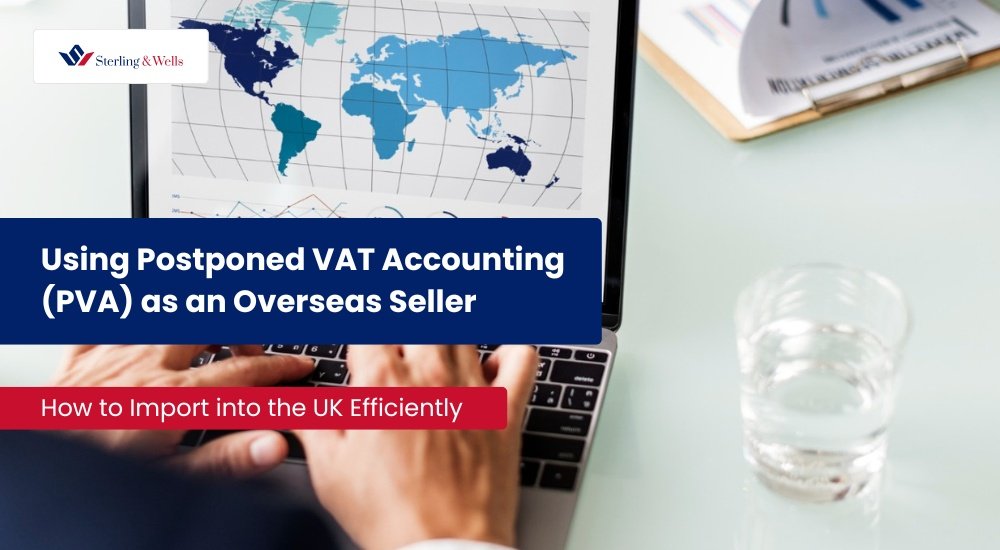Using Postponed VAT Accounting (PVA) as an Overseas Seller: How to Import into the UK Efficiently

Selling to UK customers via platforms like Amazon, Etsy, or eBay often involves importing stock into the UK. For non-UK sellers, managing import VAT can significantly affect cash flow.
Fortunately, Postponed VAT Accounting (PVA) allows VAT-registered sellers to defer this cost. Instead of paying import VAT upfront at the border, sellers can declare and reclaim the same amount on their next VAT return—creating a smoother, more cash-efficient process.
What is Postponed VAT Accounting?
Postponed VAT Accounting (PVA) is a UK government scheme introduced after Brexit. It allows UK VAT-registered businesses, including overseas sellers, to defer import VAT when bringing goods into Great Britain. Instead of paying VAT to the courier or freight agent at the point of entry, the importer declares the VAT on their quarterly VAT return.
Who qualifies?
You must have a valid UK VAT registration. Once registered, most couriers and marketplaces (e.g. Amazon’s import services) automatically apply PVA for your shipments—no special application needed. You can opt out, but this must be communicated in advance to your customs agent or carrier.
How to Apply for Postponed VAT Accounting
When using PVA, your shipment is cleared into the UK without charging you VAT immediately. Instead, HMRC generates a monthly postponed import VAT statement, summarizing the total VAT owed for that period. This statement is linked to your EORI and VAT number.
Here’s how to apply for postponed VAT accounting correctly:
- Download your monthly PVA statement from HMRC’s Customs Declaration Service (CDS). Save it offline—HMRC retains these statements for only 6 months.
- On your next UK VAT return:
- Box 1 (output VAT): Enter the total VAT from the PVA statement.
- Box 4 (input VAT): Enter the same amount to reclaim it.
- The net effect is zero, but it must still be reported to show legal compliance.
Important
Even though you don’t pay the VAT in cash at the border, you are still legally liable for the import VAT. It’s just being reported and reclaimed at the same time.
Marketplace Imports and PVA: What Sellers Should Know
For sellers using Amazon FBA, PVA is often applied automatically. Amazon’s Import VAT Handling Service typically clears inbound inventory using your VAT details and applies PVA. You might see confirmation in reports or shipping notifications.
If you’re importing via FedEx, DHL, UPS, or DPD, many of these couriers also apply PVA by default. However, always confirm their terms and make sure your UK VAT and EORI numbers are on file with them.
If you’re managing your own shipments through a customs broker or freight forwarder (e.g., importing to a personal UK warehouse), you or your agent must indicate PVA manually on the import declaration form (Box 8 of the C88 form).
When PVA Is Not Applicable
While PVA covers most commercial shipments, there are some exceptions:
- Postal imports under £135 (typically sent via Royal Mail or Parcelforce) are not eligible for PVA unless they’re processed as business/commercial shipments.
- Certain excise goods or imports using special customs procedures may be restricted.
- If you’re importing informally (e.g., without a customs broker or proper EORI link), PVA may not apply.
Benefits of PVA for Marketplace Sellers
The primary advantage of using PVA is improved cash flow—you avoid the need to pay VAT upfront when importing inventory. Instead, you declare and reclaim it in the same VAT return cycle. This is especially useful for sellers importing at scale or holding UK stock for fulfillment.
Additional benefits include:
- Simplified accounting with fewer immediate costs at customs.
- No penalties as long as you follow the rules and report accurately.
- Streamlined integration with digital VAT reporting systems (e.g., Xero or QuickBooks).
Conclusion: Why PVA Matters for International Marketplace Sellers
For non-UK businesses selling into the UK, Postponed VAT Accounting is more than just a compliance tool—it’s a practical way to support sustainable growth. By deferring the cash payment of import VAT, PVA frees up working capital, supports faster scaling, and reduces operational complexity at the border. To take full advantage, ensure your UK VAT and EORI numbers are in place, coordinate with your logistics partners, and always reconcile your PVA statements with your VAT returns. When used correctly, PVA helps turn cross-border compliance into a competitive advantage.
Prasun
Prasun Shrestha is a specialist in accounting and taxation and has served numerous clients based inside and outside UK achieve regulatory compliance and optimal performance.

